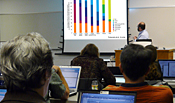You are here
Scientist Tawnya Peterson to Present on Phytoplankton Ecology
 Tawnya D. Peterson from the Institute for Marine Sciences at the University of California, Santa Cruz will present a seminar on phytoplankton ecology in the context of anthropogenic forcing and climate variability. The talk takes place on May 7, 2007 at 11 a.m. in the Paul Clayton Building, room PC401.
Tawnya D. Peterson from the Institute for Marine Sciences at the University of California, Santa Cruz will present a seminar on phytoplankton ecology in the context of anthropogenic forcing and climate variability. The talk takes place on May 7, 2007 at 11 a.m. in the Paul Clayton Building, room PC401.
Abstract: Marine primary production accounts for approximately half of global photosynthesis, most of which is accomplished by unicellular algae that have rapid turnover rates and exhibit great biological diversity. The form and function of microorganisms both reflect and exert a profound influence over nutrient cycles and food web structure in the ocean. With increasing pressures arising from anthropogenic activities, it is critical that we improve our ability to predict ecosystem responses to climate change, gain sufficient knowledge to protect and manage marine resources, and engage the public in these endeavors. The pivotal role that phytoplankton play in global biogeochemical cycling underscores the importance of obtaining a thorough understanding of factors that govern and regulate their growth, and yet significant gaps in our present knowledge remain. By employing new and emerging technologies, such as satellite remote sensing and optical instrumentation, we can probe aquatic environments at higher resolution to more accurately identify the patterns and drivers of primary production, elucidate the key interactions among and within trophic levels, and understand the impacts of these processes on biogeochemical cycling in the oceans. This seminar will explore how traditional and emerging methods employed in phytoplankton research fit within the framework of the major goals of the Center for Coastal Margin Observation and Prediction at Oregon Health & Science University






